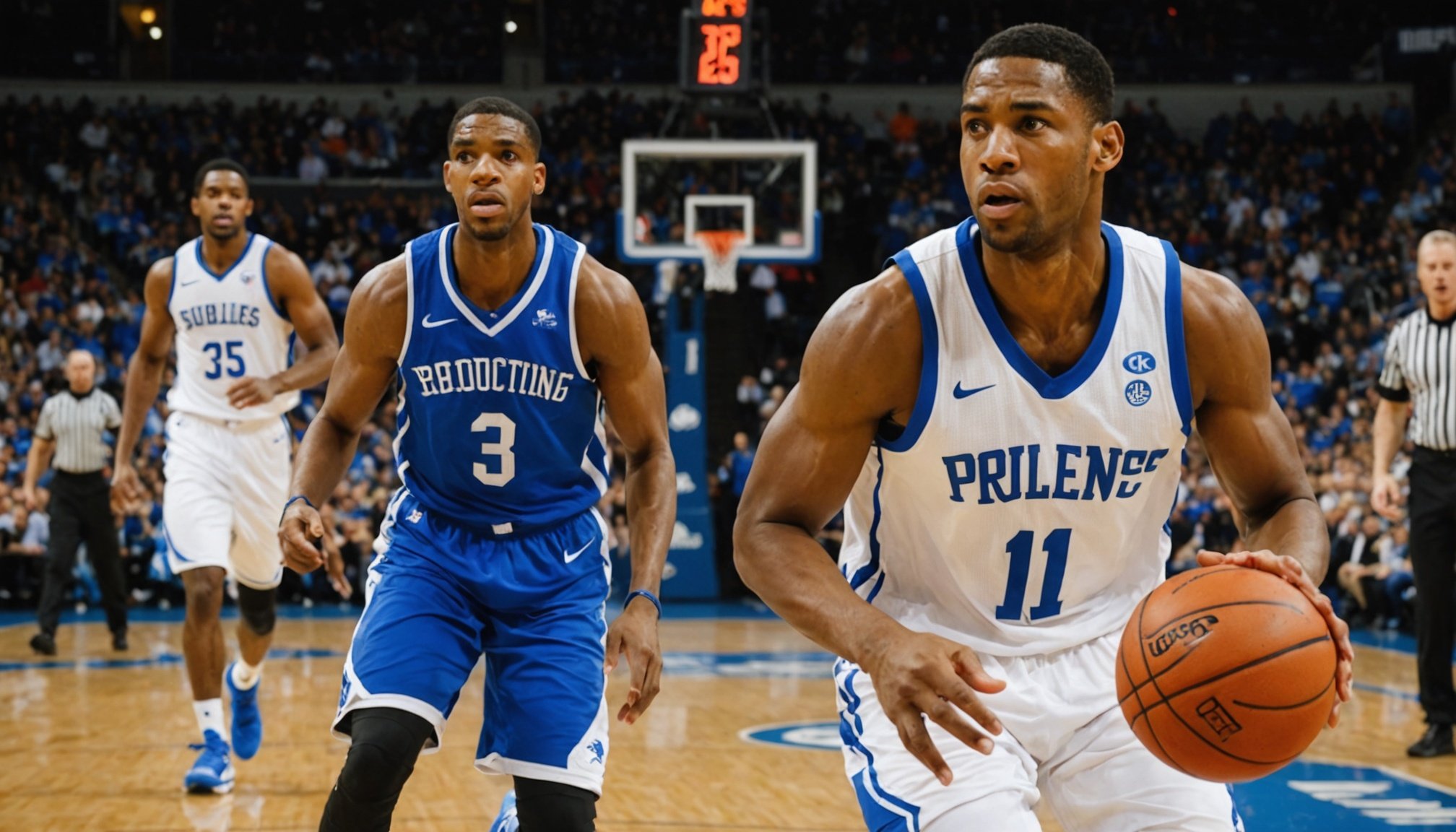Understanding Mental Toughness
Mental toughness is a crucial psychological trait in sports, reflecting an athlete’s ability to consistently perform under pressure and recover from setbacks. It’s about maintaining focus, confidence, and resilience when facing adversity. This trait can significantly impact basketball performance, where players encounter high-stress situations and must remain composed to succeed.
Basketball athletes, under constant pressure from opponents and fans, must harness their mental toughness to excel. Strong athlete resilience enables players to resist performance anxieties and enhances their ability to strategize better, even in the heat of the game. For instance, executing a critical free throw while the game is on the line demands immense mental concentration.
This might interest you : Top Exercises to Boost Ankle Stability for UK Basketball Players: Enhance Your Game!
Common mental barriers for athletes include fear of failure, pressure to perform, and overcoming past mistakes. These barriers may manifest as self-doubt, decreased focus, or even performance blocks. Surmounting these challenges requires athletes to cultivate mental toughness through consistent practice, mental conditioning, and learning to embrace pressure as a motivator.
Therefore, building mental toughness is indispensable. It empowers athletes to not only improve their basketball performance but also to navigate the psychological challenges inherent in competitive sports, ultimately leading to sustained success and satisfaction.
Also to discover : Top Recovery Strategies for UK Basketball Players to Combat Mid-Season Fatigue
Recognizing Fatigue in Athletes
Understanding athlete fatigue is crucial for maintaining both physical and mental performance. Fatigue often manifests as a noticeable performance decline, particularly in sports like basketball, where energy expenditure is high. Signs include slower reaction times, reduced coordination, and decreased endurance. Basketball players might also experience increased irritability, lack of motivation, and difficulty concentrating, signifying both mental and physical fatigue.
What is the relationship between mental and physical fatigue? Mental fatigue affects cognitive functions, leading to poor decision-making and reduced focus. It correlates with physical fatigue in that the body struggles to maintain efficiency, causing an athlete to use more energy for less output. Recognizing these signs promptly is indispensable for athletes to prevent long-term implications.
The importance of addressing fatigue cannot be overstated. Implementing effective recovery strategies, such as adequate rest, proper nutrition, and mental relaxation techniques, helps rejuvenate athletes. By prioritizing recovery, athletes can sustain optimal performance levels and avoid chronic fatigue or potential injury. Coaches and trainers should educate themselves about these symptoms to intervene appropriately, maintaining an athlete’s health and performance standards.
Essential Mental Toughness Exercises
Delving into the world of mental toughness exercises, we explore practices that improving focus and resilience, especially for athletes. These exercises not only aid in performance enhancement but are also crucial for managing stress and fatigue.
Visualization Techniques
Visualization is a powerful technique that enhances performance, particularly when athletes experience fatigue. Creating mental imagery routines involves several key steps. Athletes should vividly picture successful performance scenarios, engaging all senses to solidify the imagery. Achieving high precision through clear imagery helps maintain focus, particularly during intense moments.
Athletes who routinely practice visualization have shared testimonials about its profound impact on their performance, citing improved concentration and confidence.
Breathing Exercises
Breath control plays a pivotal role in managing stress and fatigue. Techniques such as diaphragmatic breathing and box breathing help athletes remain calm and focused. For effective integration, athletes should practice these exercises regularly, gradually increasing duration to bolster endurance and resilience.
Positive Self-Talk
Constructive self-talk significantly impacts confidence and focus. Developing habits around positive affirmations, like “I am strong and capable,” can enhance performance under pressure. Athletes should consciously replace negative thoughts with empowering phrases to foster mental resilience.
Tailored Strategies for UK Basketball Players
Cultural nuances play a significant role in formulating effective basketball strategies for UK athletes. Unique challenges, such as the limited presence of basketball compared to more traditional sports like rugby and football, must be factored into strategic planning. Acknowledging these challenges is key to developing approaches that resonate with UK athletes’ experiences.
Incorporating the esteemed traditional UK sports values, such as teamwork, resilience, and sportsmanship, can significantly enhance mental toughness training. These values are instrumental in fortifying basketball players against the psychological demands of competitive play. Emphasizing these qualities fosters a resilient mindset, equipping players to overcome on-court adversities.
To create strategies that align closely with UK basketball players’ backgrounds, it is crucial to integrate elements that players can easily relate to. This might involve adapting training drills to mimic familiar sports, ensuring they resonate and build upon existing skills. Additionally, fostering a collaborative environment where players can share insights from varying sporting experiences enhances adaptability and understanding.
By focusing on these culturally attuned strategies, coaches and trainers can bridge the gap between traditional sports values and the unique dynamics of basketball, promoting a pathway to success that is both relatable and effective for UK athletes.
Case Studies and Expert Opinions
An exploration of expert insights reveals how mental toughness can be cultivated in athletes. Sports psychologists often emphasize the importance of mental strategies in improving performance. Techniques like visualization and mindfulness are frequently recommended. These strategies help athletes manage stress and maintain focus during high-pressure situations.
Testimonials from Athletes
Many athletes attribute their success to enhanced mental fortitude. Their stories illustrate the impact of mental strategies. For instance, athletes often highlight how staying present and focused boosts their performance under pressure. These testimonials provide tangible evidence of how deliberate mental training benefits athletic performance.
Analysis of Success Stories
Case studies shed light on mental toughness success stories. One notable example involves an athlete who, through consistent application of these strategies, enhanced personal achievements. Such case studies serve as real-world examples, reinforcing the practicality and effectiveness of mental toughness exercises.
Ultimately, the combination of athlete testimonials and case studies underlines the power of mental toughness strategies. These elements, supported by professional insights, guide athletes to reach their full potential.
Incorporating Mental Toughness into Training Regimens
Training integration of mental toughness exercises alongside physical routines is crucial for athletes aiming for peak performance. Establishing a holistic regimen that balances both physical and psychological components can significantly enhance an athlete’s performance.
To seamlessly incorporate mental toughness into athlete routines, one should start by embedding exercises like visualization and focused breathing into existing training sessions. For instance, visualizing success before a workout can enhance motivation and focus. Moreover, incorporating short periods of focused breathing can help athletes remain calm under pressure, aiding overall mental resilience.
Creating a balanced approach involves not only these exercises but also periodic reassessments of both physical and mental progress. It’s important to monitor how these practices are influencing performance outcomes, allowing for adaptive strategies aimed at continual improvement. Documenting this evolution in a training journal can provide valuable insights, highlighting areas of success while pinpointing aspects needing further attention.
Furthermore, collaborating with coaches or mental conditioning experts can offer tailored strategies aligned with the athlete’s personal goals. This professional input ensures a comprehensive training plan that acknowledges individual strengths and addresses weaknesses effectively, paving the way for sustained excellence in both physical and psychological dimensions.










